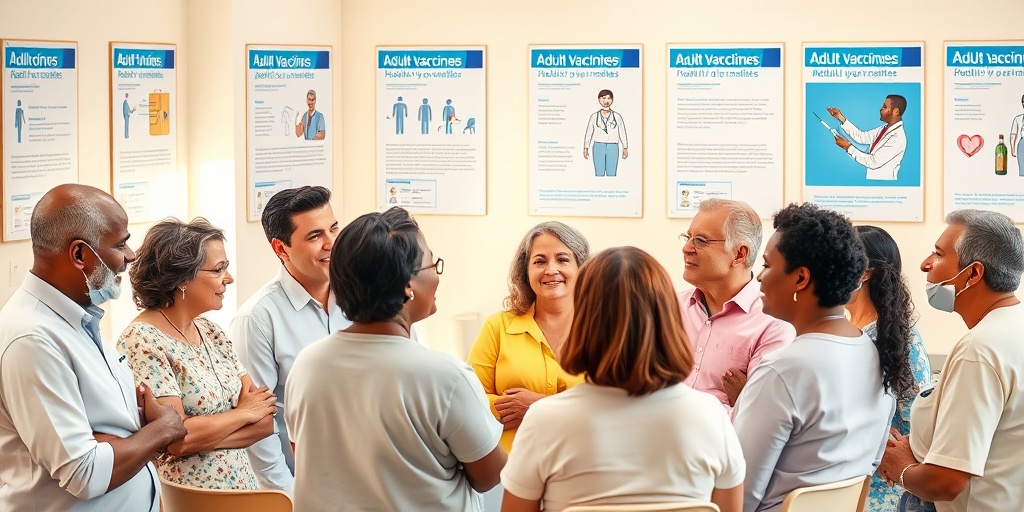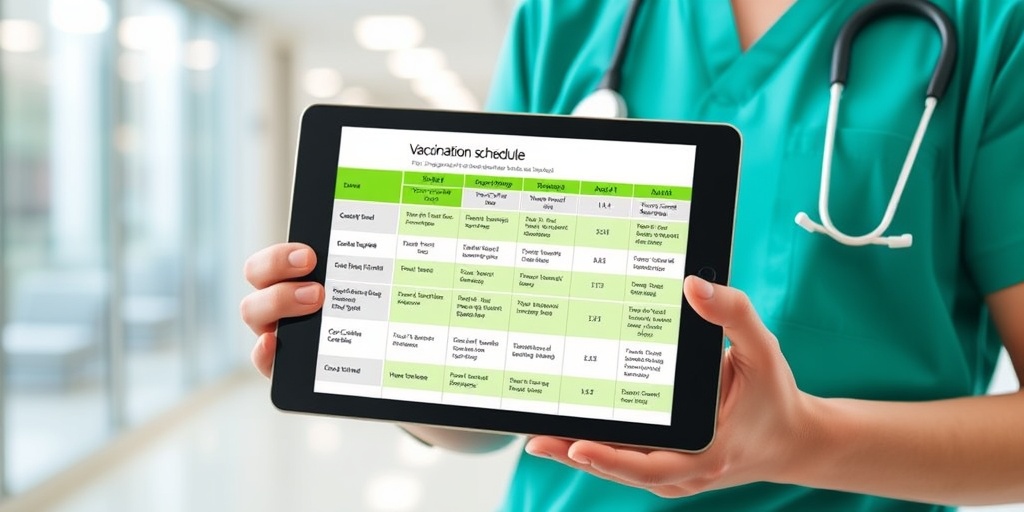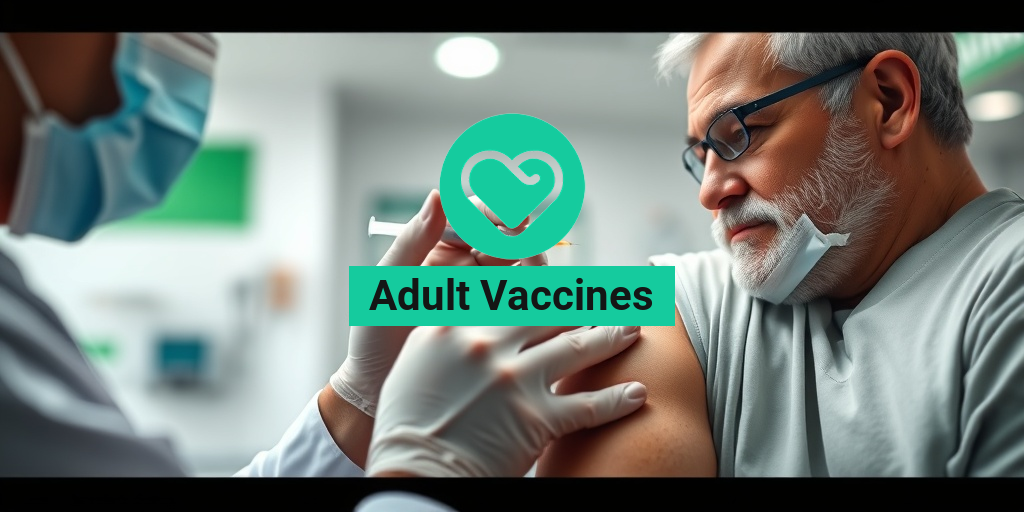What Are Adult Vaccines?
Adult vaccines are immunizations specifically designed to protect adults from various infectious diseases. While many people associate vaccines primarily with children, it’s crucial to understand that adults also require vaccinations to maintain their health and prevent the spread of diseases. Adult vaccines can help bolster immunity that may wane over time and protect against diseases that adults are at risk for due to age, lifestyle, or underlying health conditions.
Types of Adult Vaccines
There are several types of vaccines recommended for adults, including:
- Routine Vaccines: These include vaccines like the flu shot, Tdap (tetanus, diphtheria, and pertussis), and MMR (measles, mumps, and rubella).
- Travel Vaccines: Depending on your travel plans, you may need vaccines for diseases like hepatitis A, typhoid, or yellow fever.
- Occupational Vaccines: Certain professions may require specific vaccines, such as hepatitis B for healthcare workers.
- Age-Specific Vaccines: Adults over 50 may need vaccines like the shingles vaccine (Zostavax or Shingrix) to prevent shingles and its complications.
How Vaccines Work
Vaccines work by stimulating the immune system to recognize and fight off specific pathogens. When vaccinated, your body produces antibodies that can quickly respond to future infections. This process not only protects the individual but also contributes to herd immunity, reducing the overall spread of diseases in the community.
Why Vaccines Matter for Adults
Vaccines play a vital role in public health, and their importance for adults cannot be overstated. Here are several reasons why adult vaccines matter:
1. Protecting Against Serious Diseases
Many adults are at risk for serious diseases that can lead to hospitalization or even death. Vaccines can prevent diseases such as:
- Influenza
- Pneumonia
- Shingles
- Hepatitis B
By staying up-to-date with vaccinations, adults can significantly reduce their risk of contracting these illnesses.
2. Maintaining Immunity
Immunity from childhood vaccinations can diminish over time. For instance, the immunity provided by the Tdap vaccine may wear off, making adults susceptible to tetanus or pertussis. Regular booster shots help maintain immunity and protect against these diseases.
3. Protecting Vulnerable Populations
Vaccination is not just about individual protection; it’s also about community health. Adults who are vaccinated help protect those who cannot be vaccinated, such as infants or individuals with compromised immune systems. This is especially important in preventing outbreaks of diseases like measles or whooping cough.
4. Reducing Healthcare Costs
Preventing diseases through vaccination can lead to significant healthcare savings. Treating diseases can be costly, both in terms of medical expenses and lost productivity. By investing in vaccines, adults can save money and contribute to a healthier society.
5. Staying Informed and Prepared
As new vaccines are developed and recommendations change, it’s essential for adults to stay informed about their vaccination status. Resources like Yesil Health AI (yesilhealth.com) can provide evidence-based health answers and help you understand which vaccines you may need based on your age, health status, and lifestyle.
Conclusion
In summary, adult vaccines are a crucial aspect of maintaining health and preventing disease. By understanding the types of vaccines available and their importance, adults can take proactive steps to protect themselves and their communities. Don’t hesitate to consult with your healthcare provider to discuss your vaccination needs and stay up-to-date with your immunizations. Remember, a healthy adult population is vital for a thriving society! 💉🌍

Common Adult Vaccines
Vaccination is not just for children; adults also need to stay up-to-date with their vaccines to protect themselves and their communities. Here’s a look at some of the common adult vaccines that are essential for maintaining health and preventing disease.
1. Influenza Vaccine
The flu vaccine is recommended annually for all adults, especially those over 50 or with chronic health conditions. The flu can lead to severe complications, and getting vaccinated is the best way to reduce your risk. 💉
2. Tdap Vaccine
The Tdap vaccine protects against tetanus, diphtheria, and pertussis (whooping cough). Adults should receive a booster every 10 years, and pregnant women are advised to get vaccinated during each pregnancy to protect their newborns.
3. Shingles Vaccine
Shingles can be a painful condition that affects adults, particularly those over 50. The Shingrix vaccine is highly effective and is recommended for adults in this age group to prevent shingles and its complications.
4. Pneumococcal Vaccine
This vaccine protects against pneumonia and other serious infections caused by pneumococcal bacteria. Adults over 65 and those with certain health conditions should discuss this vaccine with their healthcare provider.
5. Hepatitis A and B Vaccines
Hepatitis A and B vaccines are recommended for adults who are at higher risk, including travelers to certain countries, healthcare workers, and individuals with chronic liver disease. These vaccines can prevent serious liver infections.
6. Human Papillomavirus (HPV) Vaccine
The HPV vaccine is recommended for adults up to age 26, and it can help prevent certain types of cancers. Adults aged 27 to 45 may also benefit from the vaccine, depending on their risk factors.
7. MMR Vaccine
The measles, mumps, and rubella (MMR) vaccine is crucial, especially for adults who did not receive two doses as children. Recent outbreaks have highlighted the importance of being vaccinated against these diseases.
Vaccination Schedule for Adults
Staying on top of your vaccinations is vital for your health. Here’s a general vaccination schedule for adults to help you keep track of what you need and when:
Routine Vaccinations
- Influenza: Annually
- Tdap: Every 10 years
- Shingles: Once after age 50
- Pneumococcal: Once after age 65 or as recommended
Additional Vaccinations Based on Risk Factors
- Hepatitis A: Two doses, typically 6-12 months apart, for at-risk adults
- Hepatitis B: Three doses for at-risk adults
- HPV: Two or three doses depending on age at first vaccination
- MMR: Two doses for adults without immunity
Consulting with Healthcare Providers
It’s essential to consult with your healthcare provider to determine which vaccines are appropriate for you based on your age, health status, and lifestyle. They can help create a personalized vaccination schedule that meets your needs.
Remember, staying vaccinated not only protects you but also helps safeguard those around you, especially vulnerable populations. Don’t hesitate to reach out to local clinics or pharmacies to find adult vaccines near you and ensure you’re up-to-date! 🏥

Adult Vaccine Side Effects
Vaccines play a crucial role in preventing diseases and maintaining public health. However, like any medical intervention, adult vaccines can have side effects. Understanding these potential reactions can help you make informed decisions about your health.
Common Side Effects
Most adults experience mild side effects after vaccination, which typically resolve within a few days. Common side effects include:
- Pain at the injection site: This is the most frequent reaction, often characterized by tenderness, redness, or swelling.
- Fatigue: Feeling tired or fatigued is a common response as your body builds immunity.
- Headache: Some individuals may experience headaches following vaccination.
- Muscle aches: Generalized muscle pain can occur as part of the immune response.
- Fever: A mild fever may develop as your body reacts to the vaccine.
Less Common Side Effects
While most side effects are mild, some individuals may experience more serious reactions. These are less common but can include:
- Allergic reactions: In rare cases, individuals may experience severe allergic reactions, such as anaphylaxis. This is why it’s essential to stay at the vaccination site for a short period after receiving the vaccine.
- Guillain-Barré Syndrome (GBS): This is a rare neurological disorder that has been associated with certain vaccines, although the risk is extremely low.
- Myocarditis and Pericarditis: Some studies have indicated a slight increase in the risk of these heart conditions following mRNA COVID-19 vaccines, particularly in younger males.
Managing Side Effects
If you experience mild side effects, there are several ways to manage them:
- Rest: Allow your body time to recover by getting plenty of rest.
- Hydration: Drink plenty of fluids to stay hydrated.
- Over-the-counter medications: Pain relievers like ibuprofen or acetaminophen can help alleviate discomfort.
It’s important to remember that the benefits of vaccination far outweigh the risks of side effects. Vaccines protect not only you but also those around you by contributing to herd immunity. If you have concerns about specific vaccines or side effects, consult your healthcare provider for personalized advice.
Who Should Get Vaccinated?
Vaccination is essential for adults of all ages, but certain groups may have specific recommendations based on their health status, age, and lifestyle. Understanding who should get vaccinated can help ensure that everyone is protected against preventable diseases.
General Recommendations
The Centers for Disease Control and Prevention (CDC) provides guidelines on adult vaccines that everyone should consider:
- All adults: Should receive the influenza vaccine annually to protect against seasonal flu.
- Tdap vaccine: Adults should receive a Tdap booster every 10 years to protect against tetanus, diphtheria, and pertussis (whooping cough).
- Shingles vaccine: Recommended for adults over 50 to prevent shingles and its complications.
- Pneumococcal vaccine: Recommended for adults over 65 and younger adults with certain health conditions.
Specific Populations
Some adults may have additional vaccination needs based on their health conditions or lifestyle:
- Individuals with chronic conditions: Adults with conditions like COPD, diabetes, or heart disease should consult their healthcare provider for tailored vaccine recommendations.
- Travelers: If you plan to travel internationally, certain vaccines may be required or recommended based on your destination.
- Healthcare workers: Those working in healthcare settings should be up-to-date on all vaccines to protect themselves and their patients.
Consulting with Healthcare Providers
Before getting vaccinated, it’s wise to discuss your vaccination history and any health concerns with your healthcare provider. They can help you determine which vaccines are appropriate for you based on your age, health status, and lifestyle. Remember, staying informed and proactive about vaccinations is a key step in maintaining your health and well-being! 💉

Vaccines for Travel
Traveling can be an exciting adventure, but it also comes with its own set of health risks. One of the best ways to protect yourself while exploring new destinations is by ensuring you are up-to-date with your adult vaccines. Different countries have varying health requirements, and some may even mandate specific vaccinations for entry. Here’s what you need to know about vaccines for travel.
Essential Vaccines for Travelers
Before embarking on your journey, it’s crucial to check which vaccines are recommended or required for your destination. Here are some common vaccines that travelers should consider:
- Hepatitis A: Recommended for most travelers, especially those visiting developing countries where food and water may be contaminated.
- Typhoid: Important for travelers to areas with poor sanitation. This vaccine can be administered as an injection or oral capsules.
- Yellow Fever: Required for entry into certain countries in Africa and South America. Proof of vaccination may be necessary.
- Rabies: Recommended for travelers who may come into contact with animals, particularly in rural areas.
- Influenza: Seasonal flu vaccines are essential, especially if you are traveling during flu season.
Consulting with a Travel Health Specialist
Before traveling, it’s wise to consult with a travel health specialist or your healthcare provider. They can provide personalized recommendations based on your health history, travel itinerary, and any specific risks associated with your destination. This is especially important for adults over 50, who may have different health considerations.
Timing Your Vaccinations
Timing is crucial when it comes to vaccinations. Some vaccines require multiple doses or take time to become effective. For example, the Hepatitis B vaccine requires a series of shots over several months. It’s advisable to start planning your vaccinations at least 4-6 weeks before your trip to ensure you are fully protected.
Staying Up-to-Date with Vaccines
As adults, it’s easy to overlook the importance of staying current with our vaccinations. However, keeping up with your adult vaccines is essential for maintaining your health and preventing the spread of infectious diseases. Here’s how to ensure you’re on track.
Understanding the Adult Vaccination Schedule
The CDC provides guidelines for adult vaccinations, which include:
- Tetanus, Diphtheria, and Pertussis (Tdap): A booster shot is recommended every 10 years.
- Shingles (Zoster): Adults over 50 should receive the shingles vaccine to reduce the risk of developing this painful condition.
- Pneumococcal Vaccines: Recommended for adults over 65 and those with certain health conditions.
- COVID-19: Stay updated with booster shots as recommended by health authorities.
Keeping Track of Your Vaccination Records
Maintaining an up-to-date vaccination record is crucial. This can help you keep track of which vaccines you’ve received and when you need boosters. Consider using a digital health app or a simple spreadsheet to log your vaccinations. This is especially useful for adults who may have received vaccines at different healthcare facilities.
Addressing Common Concerns
Many adults have questions or concerns about vaccines, such as their safety and efficacy. It’s important to discuss these concerns with your healthcare provider, who can provide evidence-based information. Remember, vaccines are rigorously tested for safety and effectiveness before being approved for public use.
In conclusion, staying informed about adult vaccines is vital for your health and the health of those around you. Whether you’re planning to travel or simply want to stay protected, make sure to consult with your healthcare provider and keep your vaccination records up to date. Safe travels and stay healthy! 🌍💉

Frequently Asked Questions about Adult Vaccines
What are Adult Vaccines?
Adult vaccines are immunizations recommended for adults to protect against various diseases. These vaccines help maintain immunity and prevent outbreaks of infectious diseases in the community.
Why are Adult Vaccines important?
Vaccines play a crucial role in public health by preventing the spread of diseases. They not only protect the individual but also contribute to herd immunity, which is essential for safeguarding vulnerable populations.
What is the recommended schedule for Adult Vaccines?
The adult vaccines schedule varies based on age, health conditions, and previous vaccination history. It is advisable to consult with a healthcare provider to determine the appropriate vaccines and timing for each individual.
What vaccines should adults consider after age 50?
Adults over 50 should consider vaccines such as the shingles vaccine, pneumococcal vaccine, and annual flu shots. These vaccines are particularly important for older adults due to increased susceptibility to certain diseases.
Where can I find Adult Vaccines near me?
You can find adult vaccines near you at local pharmacies, healthcare clinics, and public health departments. Many providers offer walk-in services for vaccinations, making it convenient to get vaccinated.
Are there specific vaccines for adults with COPD?
Yes, adults with Chronic Obstructive Pulmonary Disease (COPD) should prioritize vaccines such as the flu vaccine and pneumococcal vaccine to reduce the risk of respiratory infections.
What resources are available for Adult Vaccines in India?
In India, various healthcare providers and government initiatives offer adult vaccines. It’s essential to check with local health authorities or hospitals for available vaccines and schedules.
How can I stay updated on Adult Vaccines recommended by the CDC?
The Centers for Disease Control and Prevention (CDC) provides comprehensive guidelines on adult vaccines. You can visit their official website for the latest recommendations and updates.
What should I do if I missed a vaccine dose?
If you missed a vaccine dose, it is important to consult with a healthcare provider. They can advise you on how to catch up on missed vaccinations and ensure you are adequately protected.
Can vaccines cause side effects in adults?
Like any medical intervention, adult vaccines can cause side effects, although they are generally mild and temporary. Common side effects include soreness at the injection site, mild fever, and fatigue. Serious side effects are rare.
How do I know if I need a booster shot?
Booster shots are often recommended based on the type of vaccine and the time elapsed since the last dose. Consult with your healthcare provider to determine if you need a booster shot for any vaccines.




